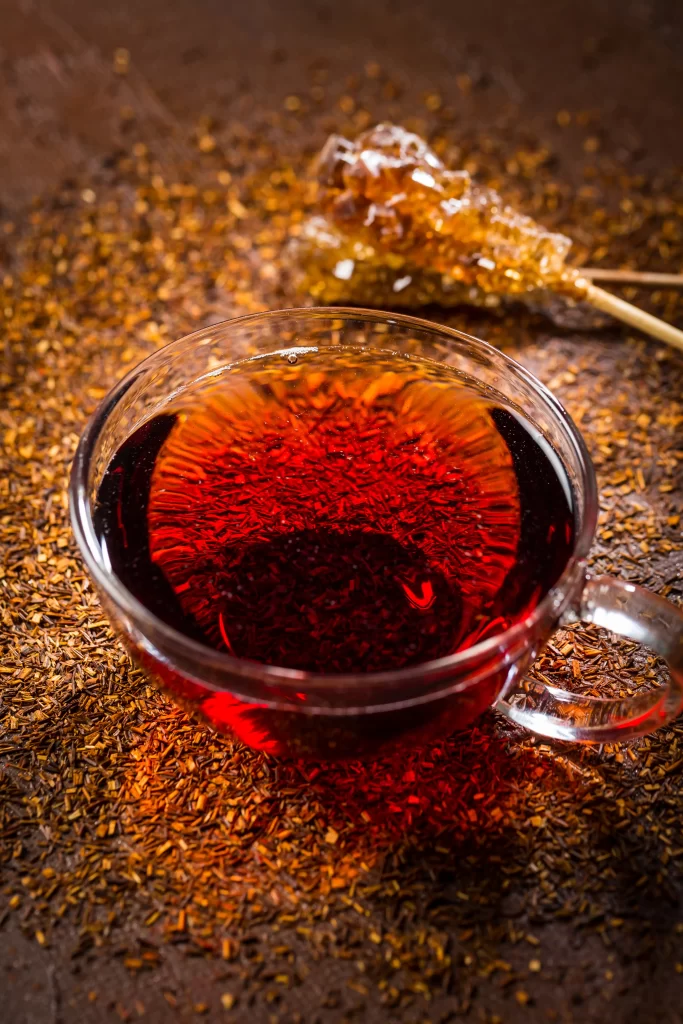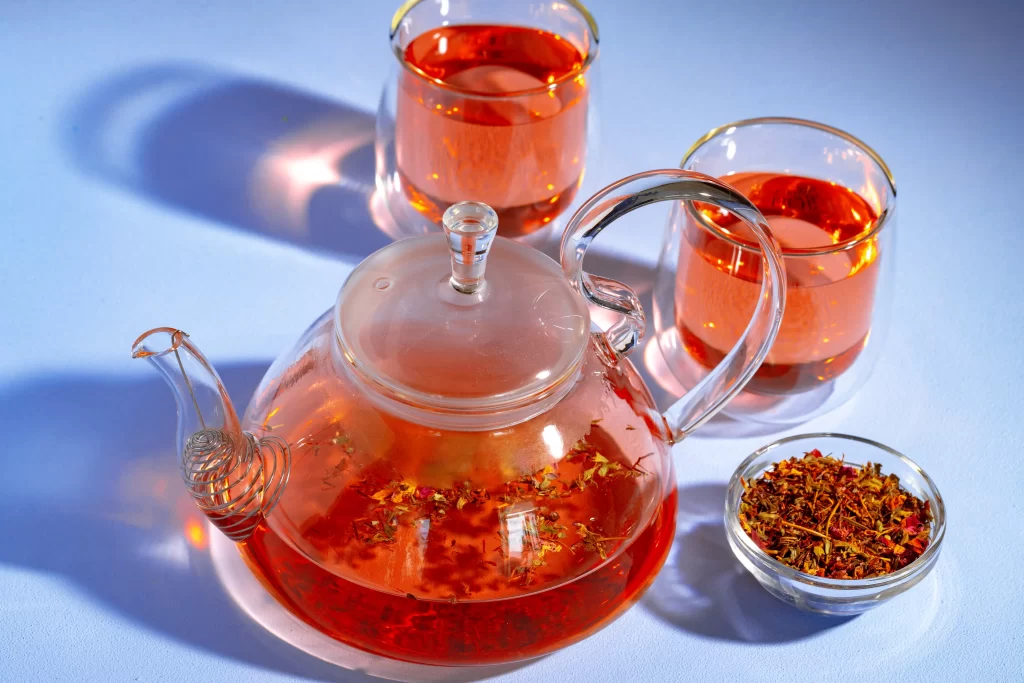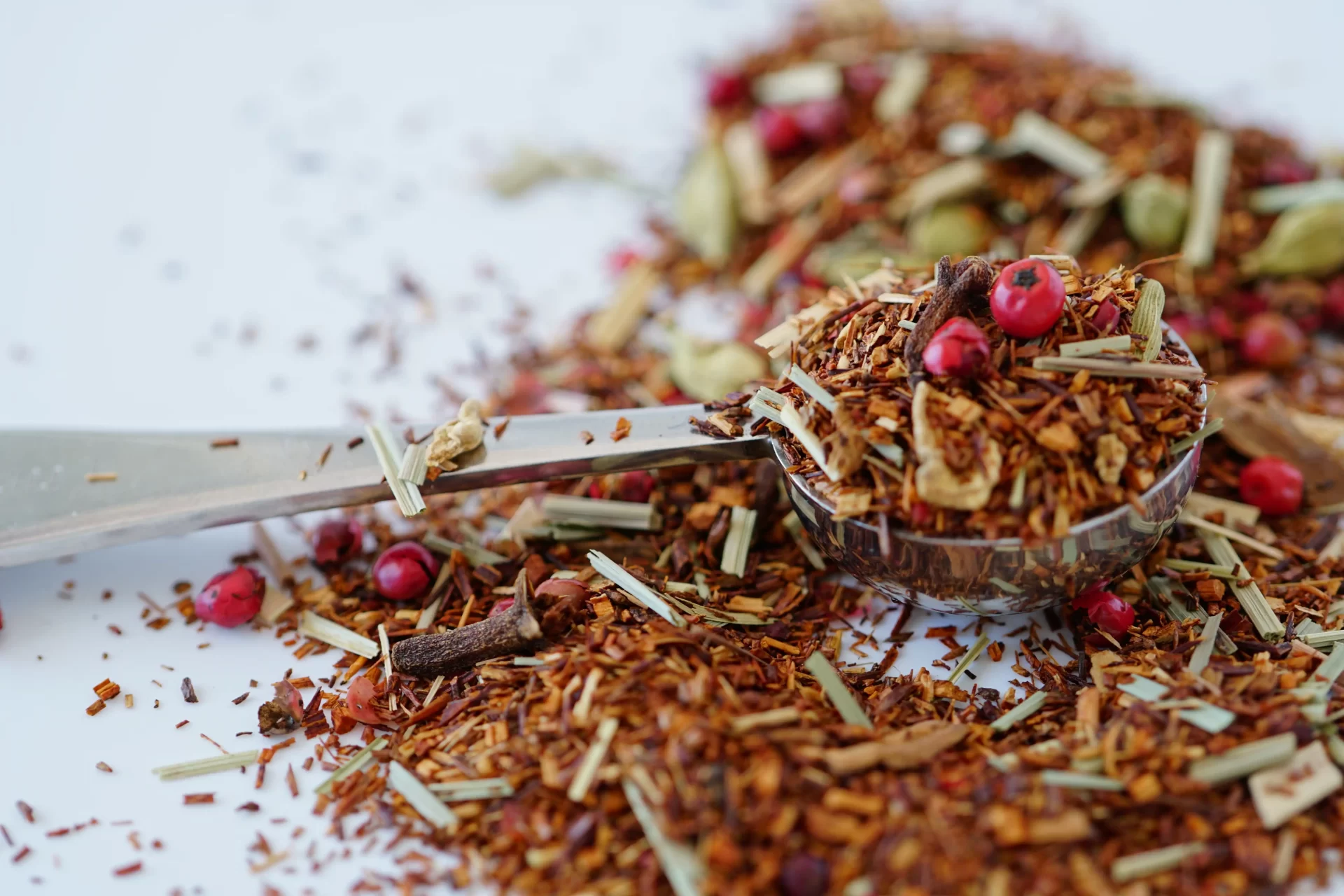Rooibos tea, also known as “Red Tea”, is a herbal drink which is made from the Aspalathus linearis plant. Unlike black or green tea, Rooibos tea lacks caffeine and its Tannin level (A substance that gives tea its astringent taste) is very low; therefore, it can be regarded as a healthy drink in comparison with black tea. Also, its properties can be considered as another specific benefit which this special tea can bring to our body. In this blog, we are going to discover anything related to this wonderful tea and reveal them for you. So stay with us.
What is Rooibos Tea?
Rooibos tea, also known as “Red Tea” due to its charming color and unique properties, is produced from Aspalathus linearis plant. This is a domestic plant in the Sierra mountains of South Africa and it specifically grows in an area called Sierresberg. Weather conditions in this area include dry summers and mild winters which has made it an ideal environment for this plant to grow. As a matter of fact, Rooibos is considered as a natural treasure in Africa and it plays a crucial role in its culture and economy. In the early 20th century, a Russian botanist named Benjamin Ginsburg 1 introduced this tea outside of Africa, and since then Rooibos tea has been recognized as a commercial product.
Origin of the Name “Rooibos”
The “Rooibos” word originated from the Afrikaans language and it means “red bush”. This name has been chosen due to the red-brown color of processed leaves of this plant.
Rooibos Tea in the African Local Culture:
It’s been centuries that the Rooibos tea has been consumed by the local people of Africa. In the distant past, local people harvested the Rooibos leaves, crushed them, and dried them in the sun to prepare a drink. This drink was used not only as an everyday drink, but also as a medication for digestive problems and headache for its therapeutic properties.
Nowadays, Rooibos tea is recognized as a healthy alternative to caffeinated teas worldwide and is used in various forms, from tea to mixed drinks, across different countries
Rooibos Plant and Its Properties:
Aspalathus linearis plant is a short shrub with thin, needle-like leaves. When these leaves are dried and fermented, they turn into a red-brown color that gives a unique identity to the Rooibos tea. There is another type of Rooibos tea that has a green color due to the lack of fermentation process which gives a mild taste and color to this green type of Rooibos tea.
Generally, the Rooibos tea is a natural gift from the Africa’s heart which has achieved a great place among the herbal teas due to its unique taste and health benefits.
Difference Between the Rooibos Tea and Other Teas
There is a fundamental difference between the Rooibos tea and traditional teas like black or green tea which we have discussed them here: 2
- Lack of caffeine: There is no caffeine in the nature of Rooibos tea which makes it a great choice for those who are sensitive to caffeine or those who look for a relaxing drink in the last hours of day.
- Low level of Tannin: Unlike the black or green tea that has a high level of Tannin and that’s the reason for its astringent and bitter taste, Rooibos tea has a low level of Tannin. This feature of Rooibos tea has brought a mild and sweet taste to it and made it a perfect choice for those with sensitivity for the tea bitterness.
- Rich in antioxidants: Rooibos tea is known for the compounds it has such as Aspalatin and Notofagin. These compounds help strengthen the immune system and reduce inflammation.
Rooibos in Scientific Research
In recent years, rooibos tea has attracted a lot of attention from researchers in various fields of medical and health sciences. This tea is recognized as a natural substance with potential therapeutic properties due to the specific compounds it contains, such as antioxidants, polyphenols, and phytochemicals. Here are some of the most important scientific studies and their findings about Rooibos tea’s effects on health and disease:
Rooibos tea and heart diseases
Rooibos tea contains antioxidant compounds such as Aspalatin and Notofagin, which have been shown to have positive effects in preventing heart diseases. Research has shown that these compounds may contribute to cardiovascular health by reducing oxidative stress and inflammation. Some studies have shown that regular consumption of Rooibos tea can lower blood pressure and help prevent blood clots. A 2014 study published in the journal Phytomedicine found that Rooibos tea may help lower blood pressure and improve heart function. This study particularly emphasized the antioxidant and anti-inflammatory effects of Rooibos tea.

Rooibos Tea
A Heart-Healthy Brew Packed with Antioxidants
Rooibos Tea and diabetes
One of the outstanding properties of Rooibos tea in scientific research is its effect on blood sugar. Some studies have shown that Rooibos tea can help regulate blood sugar levels, especially in people struggling with type 2 diabetes. This tea may increase insulin sensitivity, thereby helping to better control blood sugar. A 2013 study published in the Journal of Clinical Biochemistry and Nutrition looked at the effects of Rooibos tea on blood sugar control. The results showed that daily consumption of Rooibos tea can help reduce blood glucose levels in people with type 2 diabetes.
Rooibos Tea and cancer
Some scientific research has also shown that Rooibos tea may have anti-cancer effects due to its powerful antioxidants. Compounds in Rooibos tea can neutralize free radicals that damage cells and cause cancer. Research has shown that regular consumption of Rooibos tea may reduce the risk of certain types of cancer, such as breast cancer and skin cancer. A 2011 study in The Journal of Nutritional Biochemistry investigated the anticancer effects of Aspalatin (one of the active compounds in rooibos). This study showed that Aspalatin has anticancer properties and can reduce the growth of cancer cells.
Rooibos tea and liver health
In some studies, the protective effects of Rooibos tea on the liver have also been investigated. This tea may help reduce liver damage caused by oxidative stress and inflammation. In a 2012 study published in the African Journal of Traditional, Complementary and Alternative Medicines, it was shown that consumption of Rooibos tea can help improve liver function and protect it from damage caused by toxins and chemicals.
Rooibos tea and the immune system
Rooibos tea has anti-inflammatory and antimicrobial properties that can help strengthen the immune system. Some research has shown that drinking this tea can increase the number of immune cells and strengthen the body’s defense against infections. A 2009 study published in the “Journal of Immunology” found that consuming rooibos can help boost the body’s immune cell function and help fight infections and viral diseases.
How to Plant and Harvest
- Planting: The Rooibos tea plant grows in a sandy and acidic soil and it needs warm and dry weather. Due to the specific environmental conditions, this plant is cultivated only in the South of Africa.
- Harvesting: When the plant matures, its leaves and stems are collected and then crushed.
- Processing: To prepare tea, leaves are fermented in the first place and then, they get dried. The fermentation process gives a deep red color and an earthy and sweet taste to the leaves. Also, there is a green type of Rooibos tea which is not fermented and it has a milder taste.
Different Types of Rooibos Tea
- Red rooibos (fermented): This type of tea goes through the fermentation process and has a red color and a sweet and earthy taste.
- Green Rooibos (non-fermented): This type avoids the fermentation process and has a milder color and flavor, similar to green tea.
- Flavored Rooibos: Many brands offer Rooibos in different flavors such as vanilla, cinnamon, orange, or honey.

How to Make Rooibos Tea
- Pour a teaspoon of dried rooibos leaves into a glass of boiling water.
- Allow the tea to brew for 5 to 7 minutes.
- You can drink this tea hot or cold and make it more pleasant by adding honey, lemon or milk.
Various Uses of Rooibos Tea
- Cooking: Rooibos is used as a flavoring in desserts, cakes, and even cold drinks.
- Health products: Rooibos extract is used in the production of anti-aging creams, face masks and strengthening shampoos.
- Blended drinks: Rooibos is commonly used in blended herbal teas and even in the production of alcoholic beverages.
Rooibos Tea in World Culture
Rooibos tea, once a local drink, has become popular in many countries today, especially in Europe, America and Asia. This tea is presented in modern cafes and restaurants as a healthy and tasty option and even has a special place in the vegetarian and vegan lifestyle.
Summary
Rooibos tea is a great alternative to caffeinated teas with its mild taste and countless benefits. This popular drink is known around the world as a symbol of relaxation and health, and if you haven’t tried it yet, it’s time to add this pleasant experience to your daily drink list.
References
- https://en.wikipedia.org/wiki/Benjamin_Ginsberg_(businessman)
- https://www.healthline.com/nutrition/rooibos-tea-benefits#TOC_TITLE_HDR_5

